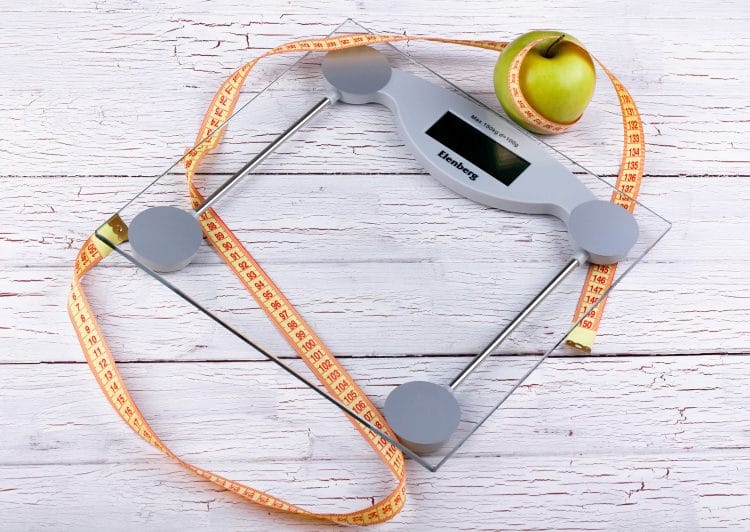Unexpected weight gain can be frustrating and stressful, especially when you are trying to lose weight. Learn about the possible causes of weight gain and how to address them effectively.
Many exercisers work out and monitor their diet for weight management. This could mean losing weight or maintaining it. Ideally, if your diet and workouts are effective, you should see the desired results when you step on the scales.
However, sometimes things don’t go as planned, and you might gain weight unexpectedly. This can be disheartening and might even reduce your motivation. Despite your best efforts, it feels like they’re not enough. Frustrating!
Before you discard your scales, abandon your diet, and cancel your gym membership, take a moment to understand the common causes of unexpected weight gain. Often, weight gain is explainable and can be managed.
In this article, we reveal the most common causes of short and long-term weight gain.
Common Causes of Short-Term Weight Gain
Short-term weight gain refers to changes over a few days up to a week. For instance, if you weigh 135 lbs. on Monday and 140 lbs. on Thursday, that’s short-term weight gain.
Level Up Your Fitness: Join our 💪 strong community in Fitness Volt Newsletter. Get daily inspiration, expert-backed workouts, nutrition tips, the latest in strength sports, and the support you need to reach your goals. Subscribe for free!
Usually, short-term weight gain is not due to muscle or fat increases. Muscle and fat weight tend to increase more gradually. Short-term weight gain is typically temporary and easy to address.
Common causes of short-term weight gain include:
1. Hydration and Water Retention
About 60% of your body is water, found in muscles, blood, digestive system, cerebrospinal fluid, and even eyes. Water serves as a medium for chemical reactions, a lubricant, and helps in temperature regulation.

Your hydration levels fluctuate constantly, influenced by activities like drinking water or sweating during exercise.
Water is heavy, about one kilogram per liter or one pound per pint. Thus, your weight changes with water levels.
If you weigh yourself when dehydrated, such as post-workout, and then when more hydrated, your weight will increase. Your body fat and muscle levels remain the same; you’re just storing more water.
Related: Truth or Myth: Does Sweating Help You Lose Weight?
Water retention can also cause weight gain. Causes include:
- Increased sodium intake – High salt consumption causes your body to retain water. Salty foods like chips or take-outs can temporarily increase your water weight.
- Increased carb intake – Carbs are stored as glycogen, which binds with water. Higher carb intake, especially after a low-carb diet, increases glycogen stores and water retention. For every gram of glycogen, your body stores three grams of water.
- Using creatine – Creatine monohydrate is hydrophilic, meaning it attracts water. Starting creatine can cause your body to retain more water, especially in muscles. Creatine HCL is an alternative that does not cause water retention. (Find your daily creatine intake here)
- Not drinking enough water – Ironically, not drinking enough water makes your body store more water. This survival mechanism ensures hydration when water is scarce. Drinking more water signals your body to release excess water.
- Medications – Some medications cause water retention. If you’ve started a new medication and noticed weight gain, this might be the cause. Check the information leaflet or consult your doctor.
2. Increases in Muscle and Liver Glycogen
Glycogen, a form of glucose bound to water, is stored in muscles and the liver. Muscle glycogen fuels the muscles it’s stored in, while liver glycogen maintains blood glucose levels for brain function.

Intense workouts and low-carb diets deplete glycogen stores. As glycogen is used, water is released, causing weight fluctuations.
Eating carbs replenishes glycogen stores. Consuming more carbs than used for energy increases glycogen and water retention, causing short-term weight gain.
Regular workouts lead to larger glycogen stores. This can cause weight gain, especially if you’re a habitual exerciser or consuming more carbs, like during carb cycling or cheat meals.
3. Undigested Food
Food adds calories, and excess calories convert to fat, causing weight gain. However, this is more of a long-term issue.
Short-term weight gain can occur due to undigested food. Weighing yourself after eating a big meal adds the weight of the food in your stomach, though body fat hasn’t changed.
Quick digestion is ideal, but low fiber diets or irregular bowel movements can cause waste buildup in the intestine, leading to short-term weight gain. Regular bowel movements can help eliminate this.
Maintain a healthy digestive system with high-fiber foods like whole grains, fruits, and vegetables.
4. Menstruation Cycle
Women often experience short-term weight gain during periods, mainly due to water retention. Craving carbs during periods can also increase glycogen and water retention.
Track your periods to predict and explain weight fluctuations, making them more manageable.
5. Inaccurate Weight Tracking
Short-term weight gain can result from inconsistent weight tracking. Weighing yourself at different times of the day or under different conditions can show fluctuating results.
Standardize your weighing practices. Weigh yourself in the same physical state each time to minimize fluctuations. The best time to weigh yourself is in the morning after your first pee.
Summing up
Short-term weight gain is rarely a serious concern. Your weight fluctuates throughout the day and from one day to the next. It’s common to think you are gaining weight when it’s just a temporary fluctuation.
Weigh yourself at the same time daily under the same circumstances. Daily weighing helps identify longer-term trends. Over a week, you can determine your average weight, which is more meaningful than daily fluctuations.
Level Up Your Fitness: Join our 💪 strong community in Fitness Volt Newsletter. Get daily inspiration, expert-backed workouts, nutrition tips, the latest in strength sports, and the support you need to reach your goals. Subscribe for free!
Consider tracking your body composition or using girth measurements (waist, hips, thighs) alongside your weight. If your weight increases but body composition remains unchanged, water or glycogen retention is likely the cause.
Common Causes of Long-Term Weight Gain
Long-term weight gain occurs over several weeks. For example, if you weigh 160 lbs. on the 1st of the month, 163 lbs. on the 12th, and 166 lbs. on the 20th, that’s long-term weight gain.
Common causes of long-term weight gain include:
1. Fat Gain
Gaining fat is the most common cause of long-term weight increases. This is especially frustrating if you’re dieting and exercising for weight loss.
Fat gain occurs when you consume more calories than you burn, creating a calorie surplus. Your body converts unused calories into fat for storage. One pound of fat contains about 3,500 calories.
Many dieters and exercisers believe their calorie intake matches their expenditure or that they burn more than they consume, yet they still gain weight.
Reasons for gaining weight instead of maintaining or losing include:
- Overestimating workout calorie burn – Many workouts claim to burn 1000+ calories per hour, but most burn around 500. Exercise burns calories, but usually less than expected.
- Being more sedentary than you think – Exercise contributes a small part to weekly caloric expenditure. Even with regular workouts, you might be mostly sedentary, leading to a calorie surplus and weight gain. Combine workouts with NEPA (non-exercise physical activity) like walking, gardening, DIY, playing with kids, washing your car, and other activities to prevent weight gain.
- Underestimating portion sizes – Many people misjudge portion sizes, leading to unintentional overeating. Even healthy eating can cause weight gain if portions are too large. Weigh and measure food to avoid consuming more than realized.
- Not tracking food intake – Calorie and food tracking can reveal hidden calorie surpluses. As the saying goes, “If you aren’t measuring it, you can’t manage it.” Tracking can help identify and manage your intake.
- Frequent diet cheating – Occasional treats won’t harm your diet, but frequent indulgences can lead to weight gain. Reduce or eliminate cheats and treats to prevent this.
- Mindless eating – The “mouth-mind gap” describes how people eat without realizing, forgetting what and how much they’ve eaten. This often happens while watching TV, eating on the go, or constant snacking. Eat mindfully and track all food intake to avoid this issue.
- Drinking calories – Beverages can contribute significant calories. For example, a small soda has 150 calories, a beer has 200, and a blended coffee drink can have 500+. All calories count, so track both food and fluid intake.
2. Muscle Gain
If you’re lifting weights and training hard, you may gain weight by building muscle. However, muscle gain is a slow process, typically only one to two pounds per month.
Muscle gain requires a calorie surplus, sufficient protein intake, and consistent strength training. You might also gain some fat with muscle. Cardio and low-intensity workouts don’t lead to muscle gain.
Small weight gains might indicate muscle mass increase, but if you’re training for fat loss or doing mostly cardio, it’s unlikely. Muscle gain usually only accounts for 1-2 pounds per month.
Related: Calculate Your Total Daily Energy Expenditure
3. Long-term Water Retention
Water retention can cause both short and long-term weight gain. You can lose body fat while retaining water, increasing scale weight while improving body composition.
Water retention cycles, affecting weight. Some people, especially women, are prone to this. Mild diuretics like dandelion extract can help, especially if bloating or puffiness occurs.
If concerned about long-term water retention, consult your doctor.
4. Pregnancy
Weight gain is inevitable during pregnancy, varying from person to person. Healthy weight gain is usually 15-25 pounds per trimester.
While weight gain is expected, avoid excessive indulgence to prevent excessive weight gain. Conversely, don’t avoid weight gain as it’s crucial for baby’s nourishment.
If you’re unexpectedly gaining weight, consider a pregnancy test.
5. Medical Reasons
There are medical reasons for long-term weight gain. While most weight gain causes are straightforward, sometimes it’s more serious. If you’ve ruled out other possibilities, consult your doctor.
Possible medical causes of weight gain include:
- Aging
- Congestive heart failure
- Cushing’s syndrome
- Depression
- Diabetes and metabolic syndrome
- Edema
- Menopause
- Polycystic ovary syndrome
- Sleep apnea
- Thyroid disorders
Summing Up
The most common causes of long-term weight gain are overeating and under-exercising. This creates a calorie surplus, leading to fat storage. Eating less and exercising more can stop long-term weight gain.
Weight management requires a long-term approach. Make healthy eating and physical activity part of your daily routine. There are no short-term fixes for long-term weight issues!
If you’re pregnant, have a medical condition, suffer from long-term water retention, or are gaining muscle, your weight will gradually increase.
Read more:
- Bulking vs. Cutting: The Best Methods To Accelerate Gains!
- The Missing Piece of The Bulking and Cutting Jigsaw
- Ectomorph Workout: The Skinny Guy’s Training Guide
- How Quickly Should You Gain Weight When Bulking?
- Weight Gain Calculator – The Bulking Calculator
- Get BIG With Our Ultimate Bulking Workout Plan
- The Anabolic Window – Training Truth or Fitness Myth
Wrapping Up
There are few things more frustrating than gaining weight when all you want to do is shed those unwanted pounds. After all, that’s the absolute opposite of what you are trying to achieve.
Use the information in this article to identify and fix the causes of unexpected weight gain. In most cases, you should have no problem getting back on track and achieving or maintaining your ideal weight.
However, in a very small number of cases, unexpected weight gain can be caused by an underlying medical condition or pregnancy. If you are still concerned about unexplained weight gain, make sure you speak to your doctor.
References:
- Kristiansen S, Gade J, Wojtaszewski JF, Kiens B, Richter EA. Glucose uptake is increased in trained vs. untrained muscle during heavy exercise. J Appl Physiol (1985). 2000 Sep;89(3):1151-8. doi: 10.1152/jappl.2000.89.3.1151. PMID: 10956363. https://pubmed.ncbi.nlm.nih.gov/10956363/
- F. M. Ivey, B. L. Tracy, J. T. Lemmer, M. NessAiver, E. J. Metter, J. L. Fozard, B. F. Hurley, Effects of Strength Training and Detraining on Muscle Quality: Age and Gender Comparisons, The Journals of Gerontology: Series A, Volume 55, Issue 3, 1 March 2000, Pages B152–B157, https://academic.oup.com/biomedgerontology/article/55/3/B152/2947975












